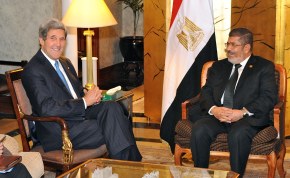Rome — Egyptian General Abdel Fattah el-Sissi's decision to run for president comes as the United States is pushing Cairo to improve its treatment of journalists and political opponents.
What does his decision mean for an Obama administration trying to balance support for Egyptian democracy with security concerns in Saudi Arabia?
Sissi's candidacy, which could bring Egypt back to the 60-year-old rule of civilian-dressed generals after a one-year-break, has been expected for months. The U.S. says the announcement has no impact on its suspension of weapons deliveries to Egypt over human rights concerns.
"As you know, we put a range of assistance on hold," State Department Spokeswoman Jen Psaki told reporters. "Last year there was some assistance, security assistance that moved forward because it was in our national security interest. But I don't have any prediction for you on when any decision will be reached on the rest."
Especially as most of those human rights concerns followed el-Sissi toppling Egypt's first democratically-elected government, leaving Washington in what former U.S. ambassador Adam Ereli called an "awkward" position.
"The good side: they're running things. The bad side: they're repressing a lot of dissent. And not necessarily disloyal dissent but any dissent," said Ereli. "That bothers President Obama and his administration. It really does."
Concerns not shared by Washington's Arabian allies, who opposed the Muslim Brotherhood ousted in el-Sissi's coup.
"Saudi Arabia and the UAE are backing Sissi and the current government in Egypt to the hilt because they see the alternative as chaos," said Ereli.
But it is Egyptian security forces that are most likely to spread chaos in an uncertain political environment, said American University professor Hillary Mann Leverett.
"It is the torturing, the imprisoning, the complete suppression," she said. "We may even see the public execution of Muslim Brotherhood leaders. That is something that will just radicalize the Muslim Brotherhood in a way that happened in previous presidencies in Egypt under Nasser and Sadat where you also had the precursors of al-Qaida."
Leverett said those threats cannot be resolved by joining Saudi backing for General Sissi.
"The idea that we can work with Saudi Arabia in Egypt to suppress popular views, popular dissent is a recipe for disaster," she said.
Deepening Washington's divide with Riyadh is the war in Syria, where Saudi Arabia wants the United States to take a more active role backing rebels fighting the government in Damascus.
U.S. Institute of Peace analyst Steve Heydemann said that's affecting how Saudi Arabia approaches elections in Egypt.
"I think it increases the risks of Saudi Arabia taking a somewhat different position on what's happening in Egypt than the U.S. would like to see," Heydemann said. "So there are a variety of spillover effects that follow."
After his meetings here in the Italian capital, Obama travels to Saudi Arabia where he and Secretary of State Kerry are expected to discuss the future of democracy and security in Egypt as well as the war in Syria.
Credit: Voice of America
Photo Credit: US Department

